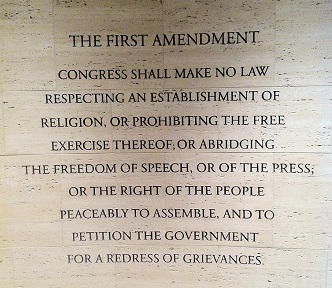- Categories:
Polls Reveal Public’s Shrinking Support for First Amendment Rights
- By Liz Button
Recent polls conducted since Donald Trump became president reveal an erosion of public support for First Amendment rights such as free speech and freedom of the press, according to Washington Post reporter James Hohmann.
 In the October 23 edition of the Post’s The Daily 202 blog, titled “The corrosion of support for First Amendment principles started before Trump. He’s supercharged it,” Hohmann writes that Trump “uses the bully pulpit of the presidency to dismiss any journalism he doesn’t like as ‘fake news.’ This daily drumbeat has clearly taken a toll on the Fourth Estate.”
In the October 23 edition of the Post’s The Daily 202 blog, titled “The corrosion of support for First Amendment principles started before Trump. He’s supercharged it,” Hohmann writes that Trump “uses the bully pulpit of the presidency to dismiss any journalism he doesn’t like as ‘fake news.’ This daily drumbeat has clearly taken a toll on the Fourth Estate.”
In his piece, Hohmann argues that Americans need to defend the First Amendment when it is attacked, and says that there also needs to be a national recommitment to civic education. The recent polls, he wrote, show that a surprising number of Americans are unaware of either the content or the implications of the First Amendment to the U.S. Constitution. The First Amendment, one of the 10 amendments that make up the Bill of Rights, prevents Congress from making any law in regard to an establishment of religion or prohibiting the free exercise of religion, or a law that abridges free speech, the freedom of the press, the right to assemble, or the right to petition the government for redress of grievances.
In his post, Hohmann cites several polls that demonstrate many Americans’ ignorance of the First Amendment’s implications. In the long run, Hohmann said, this plus Trump’s public attacks on free speech and press have the potential to damage American liberties.
An October 18 Politico-Morning Consult poll found that 46 percent of registered voters believe that major news organizations fabricate stories about Trump. The same poll, which Trump himself cited on his Twitter feed, also found that 28 percent of Americans think the federal government should have the power to revoke the broadcast licenses of major news organizations if it says they are fabricating news stories about the president or the administration. Conversely, 51 percent of respondents think the government should not be able to do this.
An annual survey published in September by the University of Pennsylvania’s Annenberg Public Policy Center found that 37 percent of Americans cannot name any of the five First Amendment rights, while close to half of those surveyed got freedom of speech but no others. The UPenn survey also found that 39 percent of Americans support allowing Congress to stop the news media from reporting on any issue of national security without government approval.
Conducted in May, a national survey by the Newseum Institute found that 23 percent of those surveyed think that the First Amendment “goes too far,” while 74 percent say they do not think “fake news” should be protected by the First Amendment.
An online survey of 1,500 undergraduate students at U.S. four-year colleges was conducted in August by Brookings senior fellow John Villasenor immediately after the “Unite the Right” rally and ensuing violence in Charlottesville, Virginia. The survey found that 39 percent of respondents said that the First Amendment protects “hate speech,” while 19 percent said it is even acceptable for a student group to use violence to prevent a guest speaker it opposes from appearing on campus.
Hohmann also cited another poll conducted by YouGov for the Cato Institute released in October, which found that 40 percent of Americans think government should prevent people from engaging in “hate speech.”
In his post, Hohmann cautioned readers against forgetting or minimizing the importance of the First Amendment and its attendant protections, noting that the polls he cited are indicative of a slippery slope that ends in a less free nation. This will happen, he argued, “if we lose the confidence that good ideas will overtake bad ones in the marketplace of ideas, if we lose the sense that we may disagree with offensive comments our neighbors say but we’ll defend to the death their right to say them and if we lose the willingness to honestly debate hard issues.”
“These polls underscore an existential threat to our way of life,” Hohmann continued. “To prevent the continuing atrophy of our democracy, concerned citizens from all walks of life and both parties must speak up for the virtue and necessity of the First Amendment wherever it comes under attack.”
Read Hohmann’s entire blog post.

